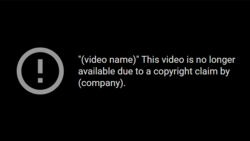This article has multiple issues. Please help improve it or discuss these issues on the talk page . (Learn how and when to remove these messages)
|

On the American social media and online video sharing platform YouTube, a copyright strike is a copyright policing practice used by YouTube for the purpose of managing copyright infringement and complying with the Digital Millennium Copyright Act (DMCA), [1] which is the basis for the design of the YouTube copyright strike system. [1] For YouTube to retain DMCA safe harbor protection, it must respond to copyright infringement claims with a notice and take down process. [1] YouTube's own practice is to issue a "YouTube copyright strike" on the user accused of copyright infringement. [1] When a YouTube user receives a copyright strike, they are required to watch a warning video and complete a quiz about the rules of copyright. A copyright strike will expire after 90 days. However, if a YouTube user accumulates three copyright strikes within those 90 days, YouTube terminates that user's YouTube channel, including any associated channels that the user has, removes all of their videos from that user's YouTube channel, and prohibits that user from creating another YouTube channel. [1] [2]
Contents
- Reasons for strikes
- Disagreements about what constitutes fair use
- Suppression of criticism
- Strikes for posting own work
- Strikes for works in the public domain
- Strikes for unknown reasons
- References
- External links
YouTube assigns strikes based on reports of copyright violations from bots. [3]
Some users have expressed concern that the strike process is unfair to users. [4] The complaint is that the system assumes the guilt of YouTube users and takes the side of copyright holders even when no infringement has occurred. [4]
YouTube and game company Nintendo were criticized by Cory Doctorow, a writer for the blog Boing Boing , due to them reportedly treating video game reviewers unfairly by threatening them with strikes. [5]